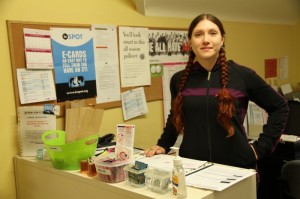The sexual health clinic at Camosun’s Lansdowne campus offers a place for students to go and, well, get their junk checked out. But funding for the clinic is never guaranteed, leaving it in a constant state of flux.
The Camosun clinic, located on the top floor of the Richmond House and running 1:30-4:30 pm Thursdays, is run by the Island Sexual Health Society, a non-profit organization, and is partially funded by the Camosun College Student Society (CCSS).
The clinic’s head nurse, Charlotte Brown, finds the uncertain state of the clinic troubling.

“The college renews the contract every year with us, so we run it October to April one day a week and they review that in the summer after we’ve closed,” says Brown. “What we do every year is we pack up in April, because we never know if the clinic’s going to be funded the following year.”
The college provides the facilities and the CCSS budgets a maximum of $10,000 to cover wage costs incurred by the clinic.
Brown and Kim Harding, the medical office assistant, staff the facility, which offers vital services to students, such as testing for sexually transmitted infections and reasonably priced birth control, all within walking distance of classes.
This accessibility makes it more likely for students to address their sexual health concerns, but where would students go if the funding ceased and there wasn’t a Camosun clinic?
“Maybe to walk-in clinics, but I’m sure a lot of people wouldn’t bother if there wasn’t something provided by the school,” says Rachel Kerr, a university transfer student at Camosun.
Brown believes that a closure of the on-campus sexual health clinic could result in less students using the service.
“We know that with a lot of sexual health for younger people that accessing services without having to travel a great distance is really important and making appointments and having to get somewhere is often quite tricky,” she says.
The clinic offers quick, free appointments for students, and most are only 15 minutes long so they won’t cut into studying time.
Many students, including some from UVic, take advantage of the services offered at Camosun, according to Brown.
Each weekly clinic sees six to 10 clients and roughly 70 percent of those who have used the clinic since September are students at Camosun.
The clinic is open to non-students as well, but Brown states that more students, especially men, should head to the clinic. Currently, roughly five percent of the clinic’s clients are male.
“I do see the guys, but I don’t see them enough,” she says.
For now, the status of the Lansdowne clinic is that it will remain open until April 2012, providing cost-effective sexual health for students.
“That’s how you work, in a non-profit organization, anyway,” says Brown, “because we’re not there to make money; we’re there to cover our costs and provide a service for the clients.”

